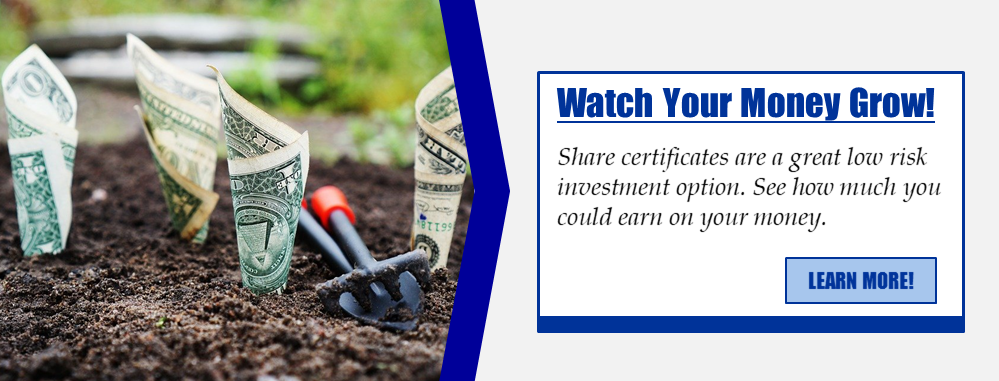
Are Savings Certificates Right for You?
If the lump under your mattress is getting uncomfortably big and you’re looking for a safer, more lucrative place to park your savings, look no further than Section 705. As an institution that’s completely devoted to your financial wellness, we offer several secure options for savings, including: Share Certificates, Traditional IRAs, Lucky Lagniappe Savings, Christmas Club, Vacation Club, Super Green, Youth Savings, and Regular Savings Accounts.
Another excellent option we offer our members to help their savings grow is our savings certificates. They are sometimes also known as share certificates, and referred to by banks as CDs. These unique accounts offer the best of both worlds when it comes to your savings. First, you’ll be giving your money a greater chance at growth than it would have in a typical savings account. Secondly, you are not subjecting your savings to the inherent risks and potential for loss that accompanies investing in the stock market.
Let’s take a closer look at the way this fantastic savings product works and why it might be the perfect choice for you.
What is a Certificate?
A savings certificate is a federally insured savings account with a fixed dividend rate and a fixed date of maturity. The dividend rates of these accounts tend to be higher than those on savings accounts and some money market accounts. Generally, there is no monthly fee to keep the certificate open.
However, unlike a savings account, your money will be tied up in a certificate. A typical certificate will not allow you to add any money to the certificate after you’ve made your initial deposit. You also won’t be able to withdraw your funds before the maturity date without paying a penalty.
Terms and conditions of Certificates
As a member of Section 705, you can open up a certificate today. However, there are some basic requirements that must be met before you can do so, including a minimum opening balance and a commitment to keep your money in the account for a set amount of time.
The minimum amount of funds you’ll need to deposit to open a certificate will vary widely from one financial institution to the next and also depends upon the term you choose. Some institutions will accept an initial deposit as low as $50 for a certificate. Others, such as a “jumbo” certificate, will demand an opening balance of $100,000. In general, the more money you invest in a certificate, the higher rate of interest it will earn. At Section 705, you can open a certificate with as little as $100 at an Annual Percentage Yield (APY) of .25%.
Certificate term lengths also vary greatly among financial institutions, with most offering a choice of certificates that run from three months to five years. Typically, certificates with longer maturity terms will earn a higher rate. Here at Section 705, we offer our members certificates that can be opened for just 3 months or as long as 4 years. Our dividend rates start at .25 for short-term certificates and go up to 2.75 for our long-term options. To hear more about our certificate terms and rates, speak to a Section 705 representative today. Click for the dividends and disclosures on our share certificates.
Is a savings certificate for everyone?
While keeping your savings in a certificate can be an excellent option for your money, it is not for everyone. Before you go this route, ask yourself these important questions:
- Do I have an emergency fund set aside to help me get through unexpected events or circumstances?
- Do I anticipate needing to access these funds during the life of the certificate?
Remember: Your money will be tied up in the certificate and you will not be able to access it without paying a penalty. A certificate works best for people who have money set aside for a rainy day and are fairly certain they will not need to access the funds in the certificate until its maturity date.
Why keep your money in a certificate?
Here are some of the most popular reasons people choose to open a certificate:
- Low risk. While nearly every investment carries some sort of risk, your money is always safe in a certificate. With each Section 705 certificate insured by the National Credit Union Administration up to $250,000, you can rest easy, knowing your money is completely secure.
- Higher dividend rates. Certificates offer all the security of savings accounts with higher yields. It’s more for your money, just for choosing to invest it in a certificate.
- Locked-in rates. There’s no stressing over fluctuating national interest rates with a certificate. The APY is set when you open the account and is locked in until its maturity date. Instead of playing guessing games, you can determine exactly how much interest your money will earn over the life of the certificate the day you open it.
Sources:
https://www.nerdwallet.com/blog/banking/cd-certificate-of-deposit/
https://www.thebalance.com/cd-basics-how-cds-work-315245
https://www.businessinsider.com/5-things-no-one-knows-about-cds-2012-10



